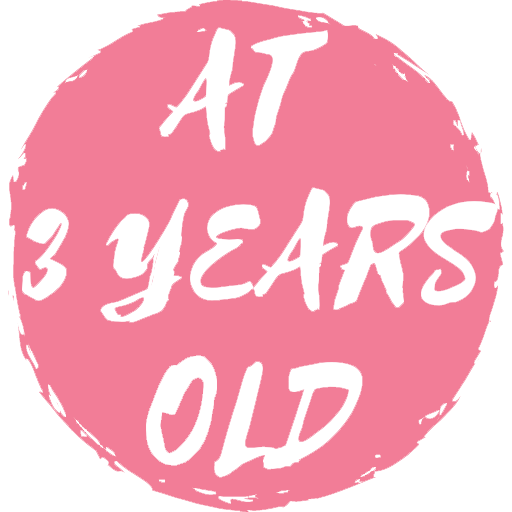15 ways to improve a 3-year-old’s Vocabulary

Age 3 is one of the most important formative years in a child’s life. This is the time they start picking up new words rapidly and the basic foundation of their vocabulary is laid on the ground. During this time, as a parent, you have the responsibility to provide them with all the help they might need to start building a strong vocabulary.
Whether it is an actual word or just a sound, as soon as your child utters their first word, they start building their vocabulary. Every child’s first word is special and is something worth celebrating. But once you have rejoiced in their first-ever learning milestone, the real work begins. It is up to you now, to make sure that they form a vocabulary that is going to help them in their future endeavors.
If you are wondering how you can help your 3-year-old build and improve their vocabulary, we are here to help you.
Easy ways to help build your 3 year old child’s vocabulary
- Bedtime stories – Reading a story to your child every night before bed can form a healthy, lifelong habit of reading books. Read to them small parts of the story and then pause to ask them if they understand what is being said in the story. Explain to them the meaning of each word. Read to them the same story twice or more just to see if they are catching on to the meanings and the plot better than the last time. If they are particularly fond of one particular story, ask them what happens next. In this way, they will start picking up a variety of new words.
- Sing to your child – Sing fun and little songs to your child. It can be educational or just a happy song. Try to get your child to sing along with you and from time to time, explain to them what exactly they are singing about. Teach them to perform actions along with the songs, like stomp, clap, and laugh and say ‘hello’ to the tune of the song. This can be a fun and exciting way for your child to improve their vocabulary.
- Have conversations with your child – Talking to your child is very important. Have regular conversations and allow them to express themselves. Teach your child to communicate what they want or need and respond to their demands. Do not oversimplify the words while talking to your child. If necessary, pause and ask your child if they are understanding what you are saying.
- Explore your surroundings – Name everything that your 3-year-old child sees around themselves. Beginning from simple furniture to various objects, familiarize your child with the name of each item. Allow your child to ask questions and tell them what they need to know. In general, a 3-year-old kid is very inquisitive and will have plenty of questions. Be patient and answer them solemnly. If a child feels that they are being taken seriously, it will only encourage them to ask more questions and learn faster.
- Point at objects and name them – Occasionally, when you take your child outside your home, show them new things and tell them the name of those things. Play a game where you will point at random objects and your child will name them. This can be an effective way to teach your child new words and familiarize them with their surroundings.
- Set up play dates with other children – Interacting and spending time with children their age might help your 3-year-old pick up new words a lot faster. Playdates under parental supervision can be a fun and exciting way for your child to learn and grow. Communicating with other children will enrich your 3-year old’s vocabulary without even having to put any effort into it. This will also help them learn how to socialize and function in a group.
- Make a habit of learning one word per day – Even though your child is likely to pick up more than one word per day, it is still a good idea to make it a point to teach them at least one word every day. You can do it every morning and ask them later in the day if they remember what it means. This habit of learning one word per day will remain with them even when they are grown and will help them achieve a strong vocabulary.
- Introduce sensory words to their vocabulary – Through regular conversations; try to introduce them to sensory words. You can ask them whether they are feeling cold or warm. Ask them how it feels when you take them outdoors after the rain. Even if they cannot articulate their feeling and the sense they might be experiencing, allow them to use as many words as they need. Sometimes, prompt them words that you think they are reaching for but always, allow them space and time to use their own words.
- Maintain a journal – This is a task specifically meant for parents. Maintain a journal to keep track of all the words that you may have taught them or you may have heard child use. This way, you can bring these words up in a conversation with them so that they don’t forget them.
- Play word games – Play charade or word games to boost your 3-year-old child’s vocabulary in a fun and exciting manner. When waiting in line for your pediatrician or stuck in traffic, you can play these games. You can introduce small prizes to make the game more exciting and to motivate your child to participate in the game enthusiastically.
- Use picture books – Buy bright, colorful picture books and let your child’s imagination run wild with crayons and colored pencils. Ask them to describe what they are coloring or painting use their own words. This will enrich their vocabulary and you will be able to add newer ones to it as you go along.
- Roleplay characters from their favorite books – Your child’s favorite story is a key to enriching their vocabulary. You may use that story in several ways until they finally grow tired of it. Pick characters from the story and role play them with your child. Teach your 3-year-old all their favorite dialogues and make sure that your child understands the meaning of the words they are uttering. If your child grows tired of one story, move onto another one. Sometimes, allow your child to make up newer plots and their own dialogues and play along with them.
- Pause and ask them what a certain word means – From time to time, ask them randomly what a certain word means. Do not overburden them or pressurize them. Ask the as if you genuinely do not know the meanings and if they are unable to tell the meanings, let them know and move on.
- Point out body parts – Point out all the different parts of your child’s body, like nose, eyes, mouth, lips, ears, hands, legs, etc. Slowly familiarize your 3-year-old with their anatomy. Play little games where you will point out a certain body part and they will name it.
- Ask them about themselves – Catch up with your 3-year-old like you would with any other adult family member of your family. Ask them how their day went. If your child says they had a bad day or a good day, ask them why so and take everything they say with great solemnly. Treat your child as an individual from an early age. Make them feel the importance of the words they use and tell them about yourself too.
These are some of the ways in which you can improve your 3-year-old child’s vocabulary. Always remember that every child has their own pace of learning and no child is too slow when it comes to learning. Do not overburden them or pressurize them. Most importantly, do not let the fun and joy be lost from their learning process.

Leave a Reply